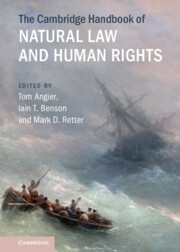Book contents
- The Cambridge Handbook of Natural Law and Human Rights
- The Cambridge Handbook of Natural Law and Human Rights
- Copyright page
- Contents
- Contributors
- Acknowledgements
- Introduction
- Part I Natural Law and the Origins of Human Rights
- Part II Natural Law Foundations of Human Rights Obligations
- Part III Natural Law and Human Rights within Religious Traditions
- 14 Natural Law, Natural Theology, and Human Rights in the Jewish Tradition
- 15 Natural Law and Human Rights in Catholic Christianity
- 16 Natural Law and Natural Rights in the Early Protestant Tradition
- 17 Human Rights or Moral Obligations?
- Part IV The Human Person, Political Community, and Rule of Law
- Part V Rival Interpretations and Interpretive Principles
- Part VI Challenges and Future Prospects
- Index
16 - Natural Law and Natural Rights in the Early Protestant Tradition
from Part III - Natural Law and Human Rights within Religious Traditions
Published online by Cambridge University Press: 03 November 2022
- The Cambridge Handbook of Natural Law and Human Rights
- The Cambridge Handbook of Natural Law and Human Rights
- Copyright page
- Contents
- Contributors
- Acknowledgements
- Introduction
- Part I Natural Law and the Origins of Human Rights
- Part II Natural Law Foundations of Human Rights Obligations
- Part III Natural Law and Human Rights within Religious Traditions
- 14 Natural Law, Natural Theology, and Human Rights in the Jewish Tradition
- 15 Natural Law and Human Rights in Catholic Christianity
- 16 Natural Law and Natural Rights in the Early Protestant Tradition
- 17 Human Rights or Moral Obligations?
- Part IV The Human Person, Political Community, and Rule of Law
- Part V Rival Interpretations and Interpretive Principles
- Part VI Challenges and Future Prospects
- Index
Summary
Natural law and natural rights are contested categories among many modern Protestants, but were common legal and theological topics for their sixteenth-century forebearers. Early Protestant reformers echoed classical and scholastic teachings, and their natural law principles and natural rights overlapped with Catholic, humanist, and republican formulations in their day. But the reformers grounded their teachings in distinct accounts of the created order, human nature, the Ten Commandments, law and Gospel, divine sovereignty and natural order in the two kingdoms - giving their views a unique accent. This chapter samples the natural law and rights teachings of Martin Luther, Philip Melanchthon, the Magdeburg Confession, John Calvin, Christopher Goodman, and Johannes Althusius. They illustrate the hundreds of Protestant sources, by Lutherans and Calvinists, Anabaptists and Anglicans of various denominations. These teachings were a driving force of early modern Western democratic revolutionaries on both sides of the Atlantic; and influential in modern international declarations of rights, in the civil rights movement in the United States, and in various liberation movements in the Global South.
Keywords
- Type
- Chapter
- Information
- The Cambridge Handbook of Natural Law and Human Rights , pp. 233 - 246Publisher: Cambridge University PressPrint publication year: 2022



